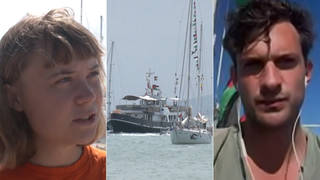
Topics
7000 tons of oil has polluted nearly 200 beaches in the Galicia region of Spain and killed more than two thirds of the shellfish in the area. Thousands of fisherman have been forced to stay on land as fisheries have been closed.
France is stepping up its fight against oil slicks a day after oysters were banned from the major shellfish-producing area, the Arcachon basin. European countries have dispatched an armada of vessels to try to minimize the damage.
Three thousand seabirds have shown up oil-covered or dead on the European coast. The Spanish Ornithological Society says one endangered species, the Iberian guillemot, has probably been wiped out.
It is a month and a half since the oil-tanker Prestige sank off the coast of Spain with more than 60,000 tons of oil. Some 20,000 tons have leaked so far. The BBC reports that when the Prestige began sinking off the Spanish coast, the French, Spanish and Portuguese governments all refused to allow the tanker to dock in their ports. Instead it was towed out to sea.
The Spanish government initially claimed the water pressure would prevent oil from leaking out of the tanker. But oil has continued to leak at a rate of 125 tons per day.
Guests:
- Jim MacKenzie, physicist and senior associate in the climate Energy and Pollution Program at the World Resources Institute. He is the author of numerous books and studies on transportation including the use of electric cars, climatic impacts of transportation as well as its impact on US culture.
- Dr. David Santillo, scientist with Greenpeace Research Labs in the UK.












Media Options